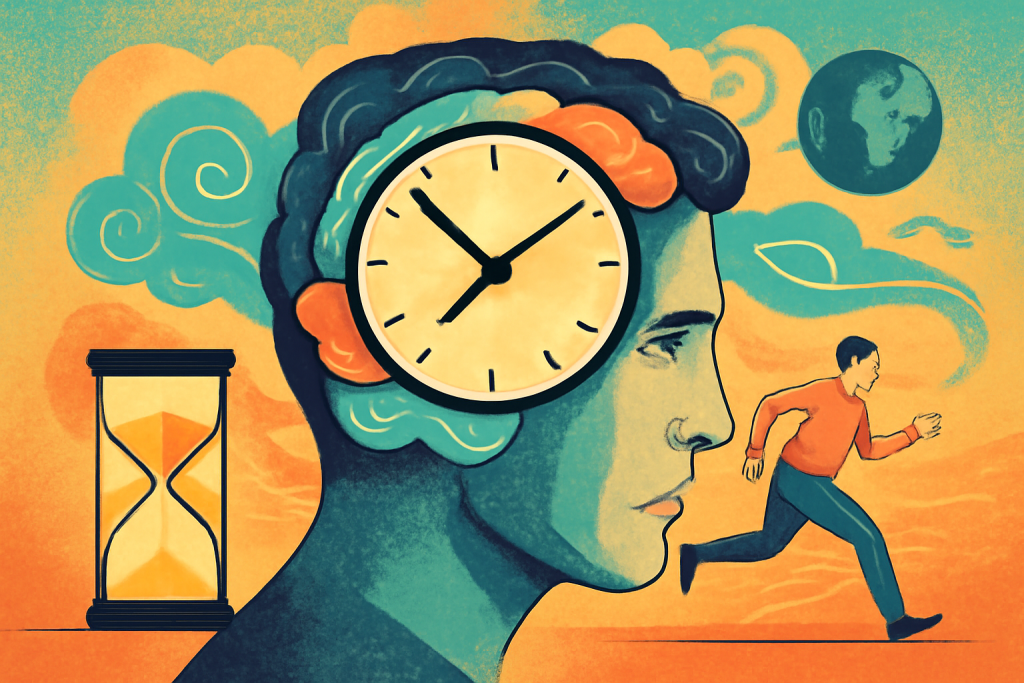Have you ever felt like time was stretching or contracting? Sometimes a moment feels like it lasts an eternity, while a day seems to pass in the blink of an eye. These distortions in time perception are rooted in the psychology of how we experience time. With new research emerging, scientists are uncovering fascinating insights into the factors that influence our sense of time. In this article, we explore the latest psychological theories and trends about time perception and explain why time seems to play tricks on us.

The Science Behind Time Perception: More Than Just a Clock
Why Time Feels Different in Different Situations
Time doesn’t pass uniformly. It speeds up when we’re having fun, but it drags when we’re bored. Recent research suggests that this is due to how our brains process information and how focused we are in a moment.
- Attention and Engagement: When we’re involved in something interesting, our brains process information quickly. This makes time feel like it moves faster. On the other hand, when we’re bored, we process less information, and time seems to slow down.
- The Role of Memory: Another theory links time perception to how much information we store in memory. When we experience many new events, we create more memories. This makes time feel fuller, and it can seem to pass faster.
The Impact of Age on Time Perception
As we age, our sense of time changes. Younger individuals often feel that time moves more slowly compared to older adults. This shift in perception happens because of the percentage of life lived. For a 10-year-old, a year represents 10% of their life. For a 50-year-old, it’s only 2%. This change affects how we prioritize tasks and manage our time.
Emotional States and Psychology of Time Perception: The Emotional Time Warp
Emotions can dramatically alter how we perceive time. Different emotional states can stretch or compress time, affecting our behavior.
- Anxiety and Stress: Research shows that stress often makes time feel like it’s moving slowly. This explains why waiting for something important or feeling anxious can feel torturous. Stress shifts our focus to the present moment, altering our time perception.
- Positive Emotions and Time: When people are happy, they often feel that time passes quickly. That’s why vacations or exciting moments seem to fly by compared to mundane activities.
The Role of Technology in Shaping Our Time Perception
Digital technology has changed how we interact with time. The rise of smartphones, social media, and on-demand entertainment has created an era of instant gratification, where we expect quick responses to our desires.
- Instant Gratification and the Compression of Time: Social media, for example, shortens our attention spans and changes how we perceive time. Constant notifications and updates make time feel compressed as we rush to respond to alerts and stay updated in real time.
- Time Shortage in the Digital Age: Ironically, while technology offers endless conveniences, it also contributes to a feeling of time scarcity. Many people feel that they don’t have enough time in their day due to constant demands and distractions from technology.
Psychological Trends and Emerging Research in Time Perception
Psychologists have started to focus on how our modern environment affects our perception of time. New studies suggest we’re facing “time poverty,” where people feel time is scarce due to modern pressures.
Neuroscientific Approaches to Time Perception
In neuroscience, researchers have identified how different parts of the brain manage time. Our internal clock, regulated by the suprachiasmatic nucleus, influences how we experience time, from seconds to years.
Time Perception and Memory: Creating the Illusion of Past, Present, and Future
Memory shapes our sense of time. Psychologists argue that how we remember events can influence our perception of their duration.
- Event Density: When we pack many memorable events into a short period, time feels longer. For instance, a busy vacation can feel much longer than it actually was because we have so many memories from that time.
- The Power of Routine: In contrast, long periods of routine can feel like they’ve passed quickly. When life becomes repetitive, we don’t create as many memories, which makes time seem to fly by.
Tips for Managing Time Perception
Understanding how our minds perceive time can help us manage it better.
- Mindfulness Practices: Focusing on the present through mindfulness techniques can slow down your perception of time. It encourages greater awareness of your surroundings and actions, making time feel richer.
- Mixing Up Your Routine: Break the monotony to prevent time from feeling like it’s slipping away. By introducing variety into your daily life, you can create more memorable moments and make time feel fuller.
- Setting Goals and Priorities: Time often moves quickly when we’re not actively engaged. Setting goals and focusing on what matters can help you feel more in control of your time.
Psychology of Time Perception: Time Is What We Make of It
Time perception is a fascinating, mysterious force that shapes our experience of life. From emotional highs to the influence of technology, our relationship with time continues to evolve. As we learn more about the psychology behind it, we discover new ways to manage and optimize our experience of time.
References:
- Eagleman, D. (2019). The Brain: The Story of You. New York: Pantheon Books.
- Block, R. A., & Zakay, D. (2006). “Prospective and retrospective duration judgments: A review.” Psychonomic Bulletin & Review, 13(3), 192-208. Available at: https://doi.org/10.3758/BF03193804
- Fraser, S., & Newton, J. (2020). “Time perception in aging: The impact of aging on time estimation.” Aging Neuroscience, 12(9), 56-65. Available at: https://doi.org/10.1016/j.jag.2020.05.005









